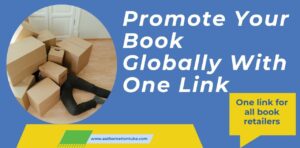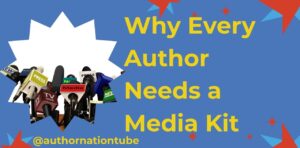This is part two of a five-part series where we’re diving into the world of public relations (PR) for authors, more specifically PR strategy vs. placement for authors. In this part, I share a common misconception and ask Lilian for her input.
NOTE: These blog posts are from an interview I did with Lilian Sue from In Retrospect Writing Services. Although we did one interview, it was an hour long, so I have divided it into five blog posts to organize it and make it easier to read.
- Part One: Unlocking Author PR | Building Strong Author Mindsets
- Part Two: Unlocking Author PR | PR strategy vs. Placement for Authors – You are here!
- Part Three: Unlocking Author PR | Common PR misconceptions for authors
- Part Four: Unlocking Author PR | Managing Your Author Reputation Online
- Part Five: Unlocking Author PR | Bridging the PR Tools Gap
You can find the video of the entire interview at the end of the blog post.
The Truth About Public Relations for Nonfiction Authors: Myths and Realities
PR can be a powerful tool, but it’s also surrounded by misconceptions that can lead authors astray. To shed light on this topic, we are sharing insights and a real-life story to illustrate the dos and don’ts of PR. Today we are comparing PR strategy vs. placement for authors.
The Costly Mistake: A PR Cautionary Tale
AN: Let’s start with a story. An author once came to me after spending thousands of dollars to have one article placed in a major media outlet, like the New York Times. They were upset and frustrated because this expensive placement yielded no results. They told me, “Public relations doesn’t work.”
To me, the problem was obvious: the author was unknown. If someone like Beyoncé pays for an article in the New York Times, it attracts attention because of her established fame. But for lesser-known authors, paid media alone isn’t enough to make an impact. One ad placed for thousands of dollars won’t garner the results a strong PR campaign will.

Mainstream Media Isn't the End-All
There’s a common misconception that landing an article in a high-profile publication is the ultimate PR goal. However, as Lillian Sue, our PR expert, points out, this isn’t true.
LS: Mainstream media reaches thousands or millions of households, but that doesn’t mean those audiences are your ideal readers.
Targeted Outreach is Key
Instead of focusing solely on mainstream outlets, consider the value of targeted outreach. It’s often more powerful to reach a smaller, engaged audience than a vast, indifferent one.
Here’s why:
- Audience Relevance: A smaller group of 200 interested readers is more valuable than 200,000 disinterested ones.
- Budget Allocation: Don’t spend your entire budget on one high-profile opportunity. Your readers are dispersed across various platforms—social media groups, podcasts, niche websites, and magazines. A diversified approach ensures broader and more effective outreach.
- Experience and Foundation: Build your PR foundation with smaller outlets. Podcasts, blogs, and YouTube shows are excellent starting points. This helps you gain experience, refine your messaging, and understand how to promote your appearances effectively.
The Importance of Building a Strong PR Foundation
Starting with smaller media outlets is crucial. This strategy helps authors:
- Gain Experience: Learn how to navigate media interactions and refine your messaging.
- Promote Effectively: Understand how to leverage your media appearances for maximum impact.
- Prepare for Bigger Opportunities: Ensure you’re ready to make the most of the high-profile stages.
Authenticity Over Paid Media
So, should you use a PR strategy or ad placement? Lillian also emphasizes the importance of authenticity in PR.
Paid media should be used sparingly. Here’s why:
- Genuine Relationships: Audiences can detect when content isn’t genuine or when there’s no established relationship. Authenticity builds trust and credibility.
- Avoiding Jarring Ads: Paid placements can be off-putting if they feel out of place. They should complement, not dominate, your PR strategy.
What Works: A Balanced PR Strategy
Successful PR is about a balanced approach, combining earned media, thought leadership, community engagement, and selective paid media. Here’s a quick breakdown:
Earned Media: Building Credibility
Earned media includes reviews, interviews, and features in articles and lists. These placements are based on merit and interest rather than payment, making them highly credible.
Thought Leadership: Establishing Expertise
Becoming a thought leader involves writing for industry publications, delivering speeches, and taking part in webinars. This positions you as an authority in your field and attracts more readers to your work.
Community Relations: Engaging Locally
Community relations involve partnerships with local media, businesses, and nonprofits. For instance, if your book is about pet adoption, you might host signings at animal shelters, engaging with local media and raising awareness for your cause.
Paid Media: Strategic Investment
Paid media can complement your PR strategy if used strategically and authentically. However, over-reliance on paid media can backfire if not executed thoughtfully.
Conclusion: Crafting an Effective PR Strategy
PR can be a powerful tool for nonfiction authors, but it requires careful planning and execution. By understanding your audience, diversifying your outreach, and building a sound foundation, you can harness the full potential of PR to elevate your author brand and reach your goals.


About Lilian
About Melody Ann
Storytelling and building relationships are the cornerstones of Lilian’s business as a PR coach and publicist. She empowers authors to gain the confidence to push past their limiting beliefs of fear, anxiety and imposter syndrome to harness the power of PR to achieve their goals of becoming global leading best-selling authors.
Through her coaching, webinars, workshops and campaigns, she de-mystifies the world of PR, giving her clients personalized support and clarity to develop strong PR mindsets, concrete goals and tailored strategies to help them get in front of the right audiences.
Melody Ann is the founder of Author Nation. She understands that writing a book starts with a long to-do list, most of the items a mystery. That’s why she developed the Book Success Blueprint and wrapped it in writing session, office hours, and more to provide accountability, support, and motivation when needed.
She has worked with both traditionally published and self-published authors and understands the pros and cons of each publishing path. Melody Ann has worked in almost every aspect of the publishing world, from book coaching, structural editing, to sales and marketing with Oxford University Press.

Promote Your Book Globally With One Link | How To Use Universal Book Links
What Does It Mean to Promote Your Book Globally With One Link? If you’re still copy-pasting separate links for Amazon, Kobo, Barnes & Noble,

It’s Time To Get Creative With Book Launches | Do Authors Need a Book Launch Party
When it comes to publishing a nonfiction book, it’s time to get creative with book launches. Whether you’re an introverted expert or a bold thought

Why Every Author Needs a Media Kit | How To Create a Press Kit That Gets You Invited To Speak
Why Every Author Needs a Media Kit for Visibility Let’s face it, getting booked on a podcast or featured by a journalist isn’t about
